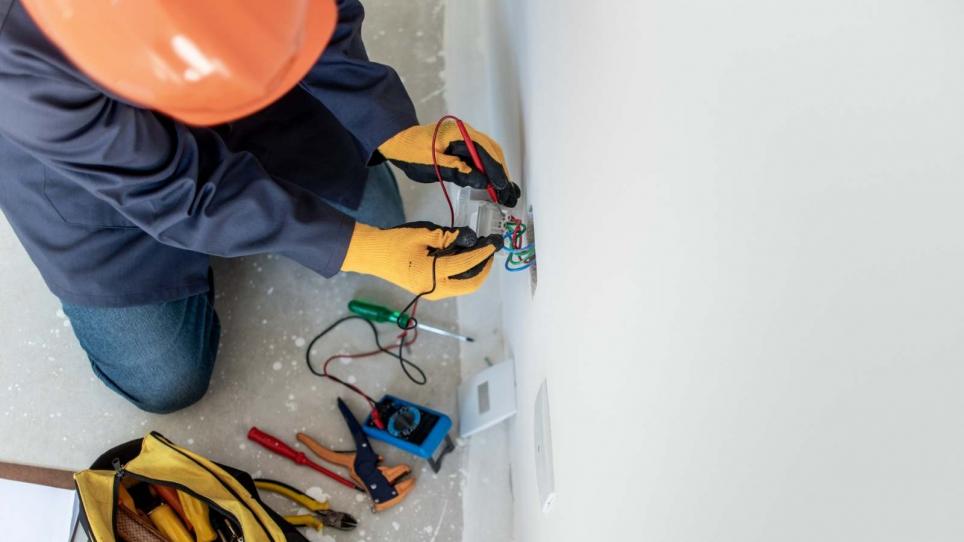
Do you want to get paid to learn your trade and become an electrician? Like other skilled trades, electricians often hone their skills through classroom learning and an on-the-job apprenticeship. But unlike an academic path toward a career, electrician apprentices typically get paid to learn.
Because the electrical trade plays a critical role in both our safety and functioning in modern life, it's no surprise that the Bureau of Labor Statistics projects this career to grow by 9% over the next decade.
Throughout the following guide, we highlight what electricians do and offer a step-by-step guide on how you can jumpstart your electrician career.
What Do Electricians Do?
Electricity plays a seemingly incalculable role in our daily lives, and electricians utilize specialized on-the-job training to ensure our access to electricity. These professionals can work in construction settings reading blueprints and installing everything from electrical wiring to transformers to other electrical systems. These workers also help maintain existing systems while identifying problems and repairing types of electrical equipment.
Some electricians follow an entrepreneurial route by starting a business, while others work for large energy and construction companies. Additionally, many electricians work for utility companies and help maintain a region's energy infrastructure. Some common electrician jobs include specialized areas like industrial, commercial, and residential.
Become an Electrician: Step by Step Guide
Working as an electrician requires specialized training and certifications to ensure a safe environment for both workers and clients. These are the essential steps to jumpstart your career as an electrician.
Step 1: Earn a High School Diploma
Whether you earn a high school diploma or a GED, completing this level of education is a vital first step in the journey toward becoming an electrician. A high school diploma is typically required when applying to electrician programs at community and technical colleges. While some for-profit trade schools have minimal admission requirements, community colleges offer standout training that boasts both accreditation and affordable tuition rates.
In addition to offering a pathway to community college, high school coursework can actively prepare students for their electrician careers. STEM-based classes like algebra, trigonometry, and physics can offer practical applications to an electrician's day-to-day work.
Step 2: Attend a Vocational or Trade School
Community colleges across the United States offer various paths for individuals beginning their electrician careers. For many individuals, an associate degree can provide specialized training in areas including construction and industrial electrician studies. These programs take about two years to complete, including classes like technical mathematics, circuits, electrical theory, and national electric code.
Similarly, electrician diploma programs focus solely on professional and technical electrician skills with fewer general education classes in unrelated academic areas. Community colleges also commonly offer technical certificates in topics such as automated industrial controls and construction electrician topics.
When seeking out a community college, vocational, or trade school, prospective students should prioritize schools that boast a network of apprenticeship programs. When applying for an apprenticeship, future electricians must pass an aptitude test evaluating basic reading comprehension and math skills.
Step 3: Complete an Apprenticeship
The most essential part of laying the foundation of an electrician career is the completion of an apprenticeship. Professional organizations like the Independent Electrical Contractors (IEC) and the International Brotherhood of Electrical Workers (IBEW) are common sources for apprenticeship opportunities, as is the United States Department of Labor.
Once securing an apprenticeship, you can expect to spend thousands of hours over 4-5 years as an apprentice electrician. Throughout this training program, you'll work under a licensed electrician while gaining job experience and learning essential skills like reading blueprints, installation, repair, and electrical maintenance while becoming deeply familiar with the National Electric Code.
Your skills will evolve throughout the apprenticeship process. Early on, you'll build foundational skills while completing basic tasks at job sites, but skills and responsibilities will grow as you build on-the-job knowledge. Students who complete an electrician program at a trade school or community college often benefit from a reduced number of hours required in their apprenticeship.
Step 4: Earn an Electrician License
While earning an electrician license plays a vital role in an individual's career trajectory, licensure requirements can vary. In addition to varying between states, some municipalities have their own requirements for professional certification.
To earn licensure or certification, you must meet the requirements for the number of training hours and successfully complete the relevant electrician license examination. Testing specifics can vary between states, but the exams traditionally measure your understanding of the National Electric Code and various professional standards.
Electrician Licensing Requirements
Electrician licensing requirements vary between states. Additionally, many states offer different levels of licensing for journeyman electricians, electrical contractors, residential electricians, electrical administrators, and master electricians. Because requirements can vary between states—and even municipalities—be sure to contact regulatory agencies to ensure you're completing the requirements necessary to secure your licensure.
Choosing an Electrician Program and Apprenticeship
When choosing an electrician program, prospective learners typically consider factors like cost, hands-on learning opportunities, the expertise of instructors, and whether the program leads to a degree. For students interested in a bachelor's degree in the future, pursuing an associate degree at a community college is a practical path.
Those wanting to hone technical skills often consider certificate programs. Certificates typically forgo unrelated academic requirements, instead of focusing on the technical proficiencies of the trade. Additionally, certificate programs allow students to complete requirements in as few as four months.
While an electrician program can mitigate the amount of time spent as an apprentice, an apprenticeship still plays an integral part in electrician training. An electrician apprenticeship typically takes 3-5 years to complete. And while the requirements can vary between states, electrician apprentices usually complete thousands of hours of supervised work experience.
Unlike traditional academic paths, electrician apprentices usually receive some financial compensation while gaining on-the-job training. Michigan-based IBEW apprentices can earn up to $15 per hour during their training.
FAQ
Subscribe to stay in the know with all our college updates.
